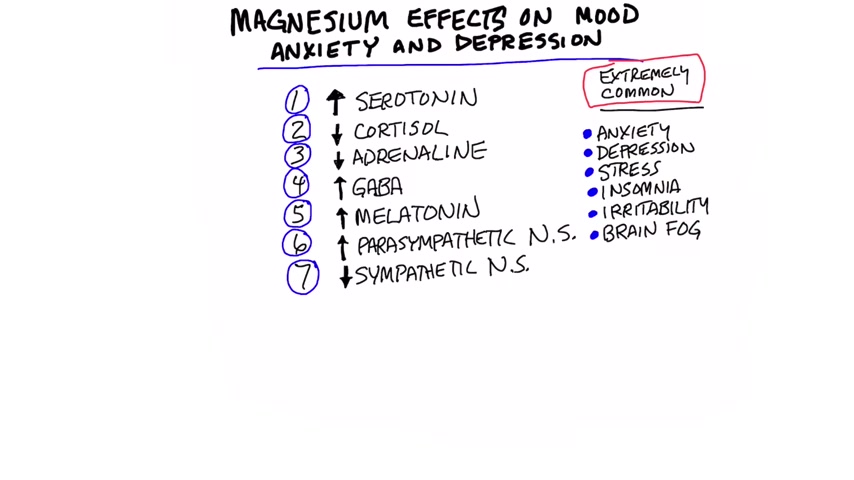
https://www.youtube.com/watch?v=aQrVVVJuPB8
Magnesium's Effect on Mood - Anxiety and Depression

Let's talk about magnesium's effect on mood , especially anxiety and depression .
There's a lot of things that magnesium does in the body .
It's involved in probably , actually , more than 300 different enzymes involved in biochemical pathways , But I wanna emphasize just one area , the effect of magnesium on neurotransmitters , which are hormone like , but instead of traveling through the blood , they travel through the nervous system .
Now a magnesium deficiency is extremely common .
Well over 50% of the population is deficient , and probably a lot more that have a subclinical deficiency .
But it's very difficult to test magnesium since only 1% of your whole body's magnesium is in the blood .
The rest is in the bone .
It's in the teeth .
It's in the muscle , and it's also inside the cell .

So you kinda have to go by symptoms and just take some magnesium , consume foods higher of magnesium , and see if these symptoms go away .
So if you're deficient in magnesium , you can get anxiety , depression , low tolerance to stress .
You're not gonna sleep that well .
You're gonna be irritable and brain fog .
Other than that , you're gonna be good to go .
But magnesium has some direct effect on increasing serotonin .
Serotonin is the hormone that kind of brings you in a state of well-being .
It actually makes you feel calm , happy , and , without stress .
Number 2 , magnesium can decrease cortisol .
So cortisol is a stress hormone .
And if it's too high , it puts you in a state of stress .
So many people have chronic elevations of cortisol , and they're stressed out , and magnesium can help them .
Alright .
Number 3 , magnesium can lower adrenaline .

K ?
So that's gonna help your sleep .
Number 4 , it can increase GABA , which is a neurotransmitter involved in relaxation and feeling calm and even sleep .
Number 5 , magnesium can increase melatonin .
It's gonna help you sleep .
Alright .
Number 6 , it can increase the parasympathetic nervous system .
What is that ?
That's the part of the nervous system that's responsible for rest and digestion .
So it calms you down .
It's actually an active , wave in your body that's pushing things down to keep things calm .
So let's say , for example , you ran up the stairs or you're exercising and then you stop .
The parasympathetic kicks in there and brings your pulse rate down and calms you down .
Without that , everything would stay fairly elevated for a long period of time .
And in practice , I used to measure the parasympathetic nervous system .
I had a , a test .


It's called heart rate variability , which measures the autonomic nervous system .
And when people would come in with very low parasympathetic function , if they were to exercise , their pulse rate would go high , and it just would not come down .
So they have to do very , very light things and , not a lot of exercise .
Alright .
Number 7 , magnesium decreases the sympathetic nervous system .
So this is the opposing nervous system .
This is the nervous system that keeps things turned on , and and it keeps you from sleeping .
So magnesium can chill that out .
And another name for the sympathetic nervous system is flight or fight .
Alright .
There you have it .
Magnesium's effects on your mood .

Before you go , if you have a question about a product or you're new to keto and you wanna know how to begin keto or you're on keto and you need to debug because it's not going smooth , I have a keto consultant standing by to help you .
This is just for the people in the US .
Hopefully , in the future , we'll be able to answer everyone's call .
But I put the number down below , so you can call and get some help .
Are you looking for a way to reach a wider audience and get more views on your videos?
Our innovative video to text transcribing service can help you do just that.
We provide accurate transcriptions of your videos along with visual content that will help you attract new viewers and keep them engaged. Plus, our data analytics and ad campaign tools can help you monetize your content and maximize your revenue.
Let's partner up and take your video content to the next level!
Contact us today to learn more.